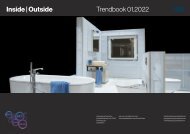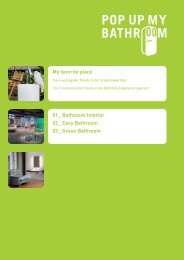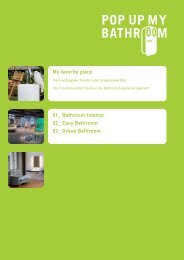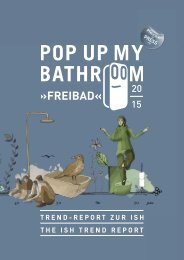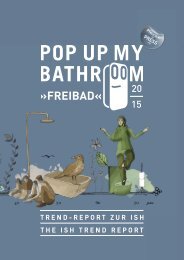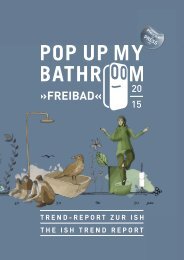My favorite place - Trendbook Pop up my Bathroom | Issue 01/2011 ISH 2011
Today’s bathrooms are no longer chilly, wipe-clean functional cells. Bathrooms are turning into living space. As simple as this meanwhile ubiquitously manifest megatrend might sound, its impact on the sanitary industry and the conceptual possibilities for bathroom design are nothing short of revolutionary. As a result, expectations of the aesthetics and functionality of contemporary bathroom design are growing. Accordingly, there will be more than “just” new products on show at the world’s leading fair for the sanitary industry, the ISH in Frankfurt. For it is not the bathtub that is being reinvented, but the entire bathroom.
Today’s bathrooms are no longer chilly, wipe-clean functional cells. Bathrooms are turning into living space. As simple as this meanwhile ubiquitously manifest megatrend might sound, its impact on the sanitary industry and the conceptual possibilities for bathroom design are nothing short of revolutionary. As a result, expectations of the aesthetics and functionality of contemporary bathroom design are growing. Accordingly, there will be more than “just” new products on show at the world’s leading fair for the sanitary industry, the ISH in Frankfurt. For it is not the bathtub that is being reinvented, but the entire bathroom.
Create successful ePaper yourself
Turn your PDF publications into a flip-book with our unique Google optimized e-Paper software.
Green Living<br />
<strong>My</strong> <strong>favorite</strong> <strong>place</strong><br />
Am liebsten würden wir unser Bad mit Pflanzen<br />
bevölkern, die blühen, duften, wuchern<br />
und von Wasserperlen glänzen. Sogar der<br />
vereinzelte Besuch eines Marienkäfers würde<br />
uns gefallen. Aber mal im Ernst: Ob wir nun<br />
die Abendstimmung über den Dächern einer<br />
Stadt genießen, wenn wir aus dem Badezimmerfenster<br />
sehen, beim Entspannungsbad<br />
an unseren letzten Urlaub am Meer denken<br />
oder nach der morgendlichen Dusche auf die<br />
Terrasse treten, um durchzuatmen – selten<br />
fühlen wir uns in unserer Tagesroutine der<br />
Natur mehr verbunden als im Bad.<br />
Das weckt Verantwortungsgefühl. Wenn wir<br />
dann die Spartaste an der Handbrause oder<br />
am Spülkasten drücken, fühlen wir uns besser.<br />
Tatsächlich liegt nachhaltiges Handeln zu einem<br />
großen Teil in der Verantwortung jedes Einzelnen.<br />
In Sachen Wasser sparen sind die Deutschen<br />
unter den Industrienationen vorbildlich.<br />
Seit den 1970er-Jahren konnte hierzulande der<br />
Wasserbedarf sogar um ein Fünftel auf derzeit<br />
rund 120 Liter pro Kopf und Tag reduziert werden –<br />
ein Erfolg von Sanitärausstattungen, sparsamen<br />
Waschmaschinen, veränderter Industriestruktur<br />
und modernen Kreislaufwirtschaftssystemen.<br />
Noch mehr Wasser zu sparen macht also nur<br />
da Sinn, wo die Kanalisation und die Wasser-<br />
Infrastruktur ausreichend ausgelastet sind.<br />
Mit sommerlichem Rasensprengen sowie mit<br />
Warmwasser hingegen sollte man überall sparsam<br />
sein – hier freuen sich Klima, Grundwasserspiegel<br />
und Geldbeutel gleichermaßen.<br />
Die Welt ist kompliziert geworden. Unsere<br />
Sehnsucht nach mehr Ursprünglichkeit lässt<br />
sich mit einer Rückkehr zum einfachen Leben<br />
nur begrenzt umsetzen, wie die Debatte über<br />
den importbedingten Verbrauch von „virtuellem<br />
Wasser“ zeigt. Der Weg zurück zur Natur führt<br />
also über eine Kultur der Reduktion und des<br />
bewussten Konsums sowie über technisch<br />
hochentwickelte Qualitätsprodukte. Und dabei<br />
hat auch der gute alte Komposthaufen durchaus<br />
wieder seine kulturelle Berechtigung.<br />
54<br />
Green Living<br />
<strong>My</strong> <strong>favorite</strong> <strong>place</strong><br />
We’d love to populate our bathroom with<br />
plants: flowering, fragrant, rampant plants<br />
glistening with beads of water. We’d even<br />
enjoy an occasional visit from a ladybird.<br />
But seriously: whether we enjoy the evening<br />
mood over the roofs of the city when we look<br />
out of the bathroom window, think back<br />
to our last holiday by the sea as we enjoy<br />
a relaxing bath or step out onto the patio<br />
after our morning shower to take a few deep<br />
breaths of fresh air – we rarely feel as in<br />
touch with nature during the course of our<br />
daily routine as we do in the bathroom.<br />
That triggers a sense of responsibility. Pushing<br />
the econo<strong>my</strong> button on the hand shower or<br />
toilet cistern makes us feel better. Sustainable<br />
behaviour is in fact largely a question of individual<br />
responsibility. When it comes to saving<br />
water, the Germans are exemplary amongst<br />
the industrial nations. Since the 1970s, the<br />
country has even managed to reduce its water<br />
requirement by one fifth to the current level of<br />
approx. 120 litres per head per day – a success<br />
story made possible by sanitary equipment,<br />
economical washing machines, a changing industrial<br />
structure and modern circular econo<strong>my</strong><br />
systems. So saving even more water only makes<br />
sense where the sewers and water infrastructure<br />
are working to sufficient capacity. On the other<br />
hand, sprinkling the lawn in summer and warm<br />
water are two things we should be economical<br />
with wherever we are – the climate, the groundwater<br />
level and our wallets will thank us.<br />
The world has become a complicated <strong>place</strong>.<br />
Our longing for more unadulterated naturalness<br />
can only be satisfied by a return to the<br />
simple life <strong>up</strong> to a point, as the debate about<br />
the import-related consumption of “virtual<br />
water” shows. The way back to nature is thus<br />
paved with a culture of reduction and conscious<br />
consumption, as well as quality products with<br />
a high degree of technical sophistication. At<br />
the same time, the good old compost heap<br />
certainly has its cultural justification again.



